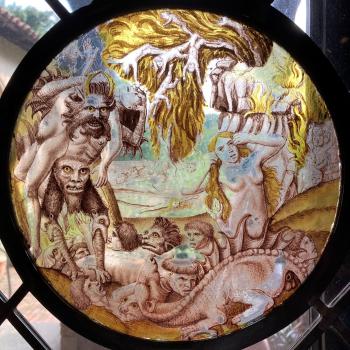
Every other month I lead a group of high school students down to a local train station to bring food to the homeless. I remind the students that we don’t go on Jesus Runs (as we affectionately call them) to do a good deed and “feel good about ourselves.”
“Giving a homeless guy a sandwich is not going to make much of a difference in his life,” I interject. “‘OMG! My life is so much better now that I have a sandwich!’ Really, guys?” They’re naive notion of charitable work as “making a difference in the world” is precious…and embarrassingly unrealistic. “We don’t go to change anyone’s life, but so that our lives will be changed.”
This time before going, we read a passage from one of Dorothy Day’s books about spiritual poverty: “[Being with the poor] is the only way we have of knowing and believing in our love. The mystery of poverty is that by sharing in it, making ourselves poor in giving to others, we increase our knowledge of and belief in [God’s] love.”
The ultimate value of serving the poor is not in accomplishing some heroic deed, but in learning from the experience. What does it really mean to be poor? How can we embrace our own spiritual poverty and open ourselves up to receiving God’s charity?
The neediness of the materially impoverished educates us to understand the neediness of our hearts…whose longing to be loved is too vast for any fellow human to satiate. The poor are Jesus’ elect class of educators. Their disposition to receptivity models what we are all called to emulate in our relationship with God.
I was surprised this time around by an overwhelming amount of donations and student volunteers…and by the underwhelming number of homeless folk standing outside the station. Perhaps it’s the cold weather…I thought to myself, as I quickly attempted to calculate how we would distribute such a disproportionate amount of goods.
Not only were there very few people to receive our donations, but some were not interested, and others scoffed at our attempt at charity.
“Would you like some food, sir?”
“What do you have?”
“A sandwich.”
“Oh, peanut butter and jelly? Nah, I don’t want that sh*tty food.”
“Yeah, no,” laughed one of his comrades, “that stuff is sh*t!”
So much for feeling good about ourselves. The turn out was enough to douse the joyful heart of even the most naive of Christians. Was this attempt at serving the poor useless? Looking at the surplus of food and clothing that no one wanted, I was forced to reconsider the value, if any, this work of charity had.
But I was reminded of what I told my students before we had left, and of Dorothy Day’s words. We go not to change people’s lives, but so that we may be changed–and above all to learn..to grow in “knowledge of and belief in God’s love.”
I learned that I the “usefulness” of my gestures of charity cannot be measured by some positivistic notion of efficiency. Contrary to the tenets of the secular humanism, I am not the ultimate judge of the value of my actions.
God’s love is not supposed to be useful, anyway…at least not in the modern sense of the word. The Incarnation, and surely the Crucifixion, were not triumphs in efficiency or utility, but in sacrifice and love. For those who are motivated by the desire to offer themselves and to learn in the process, the paradoxical event of God’s self sacrifice on the Cross is the illuminative standard by which we can make sense of our daily work.
The Mystery of the Cross remains a stumbling block for us smartphone-toting moderns who look to measure our work by the yardstick of efficiency and “results.” For many, it’s just plain absurd. A man who claims to be God allows himself to be beaten and mocked by his detractors, some of whom want to (and actually do) kill him? It’s all for Love, they say… Sentimentalized presentations of the Gospel are sweet, but when it comes down to it, there’s nothing saccharine about Christian Love. It’s mysterious, scary, and possibly even absurd.
The truth is, I have no idea how God will use our work today. But I’m not going to worry myself about whether or not it was useful. For now, I’ve resolved to accept that the value, the usefulness, of the Jesus Run remains a mystery. While I long to see how our offering will have some type of effect on the world, I’m content to say that the futility of our offering remains in his hands, to be used in whichever way he pleases.
And though it remains a mystery to me, I accept it as invitation to unite this experience to the Mystery of Christ’s state of desolation and rejection on the Cross. I have the inkling that as he looked out over the crowd of people jeering at him, rejecting his “sh*tty” offering, he might have understood at least a fraction of what we experienced today. The temptation to be overcome by the “uselessness” of his offering looms, while blood streamed out from his sacred heart to his right side–the consolation of his beloved disciple standing meekly at his feet. Fraught with failure as our offerings may be, John remains, perhaps foolishly so, a teacher to us all in the school of poverty.
















